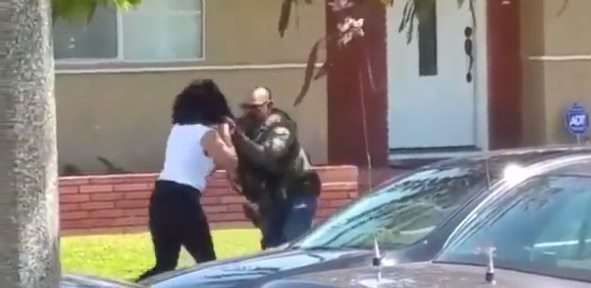Town Where U.S. Marshal Smashed Citizen's Camera Rakes in Millions from Federal Forfeiture Rules
South Gate seizes more under federal program than San Francisco.


Brian Doherty took note yesterday of an incident, caught on citizen video, of a U.S. marshal in South Gate, California, smashing the cell phone camera of another citizen who had been filming some police activity in her neighborhood.
Wondering why a U.S. marshal was part of this police sweep in the first place? Neighbors told ABC 7 there was a police sweep targeting members of the Mongol bike gang in South Gate. The U.S. Marshals recently spent six weeks working with law enforcement agencies across the country to track down arrest scores of wanted fugitives. That project ended early in April, but marshals regularly partner with police in anti-gang activities.
Still, there's more. Partnering with federal law enforcement allows South Gate's police to turn to the Department of Justice's Equitable Sharing Program for assistance in seizing and keeping assets from these raids. And South Gate does so—a lot.
A new report put out by the Drug Policy Alliance earlier this week highlighted a handful of small municipalities in Southern California who draw in asset forfeiture dollars seemingly far out of proportion to their size. South Gate is one of those cities. South Gate, situated just south of Los Angeles, has a population of less than 100,000 people, but has collected more than $7.6 million in revenue using the federal Equitable Sharing Fund between 2006 and 2013. They're ranked sixth in the state in per capita forfeiture revenue. They've received more seized funds through the federal forfeiture system during that timeframe than San Francisco (population: 800,000).
When report author Jonah Engle contacted South Gate about this trend, a senior member of the police department told him they've "always had an emphasis on drug enforcement; there is so much drugs here" and that they "dedicate an unusual amount of people to narcotics enforcement."
Well, sort of. South Gate's police force has been cut from 144 to 117 between 2009 and 2012. But South Gate increased the number of personnel devoted to asset seizure efforts by two. South Gate also, according to Engle's report, anticipates future forfeiture revenue in the budgeting process, which Department of Justice rules forbid. No wonder there's an "unusual amount" of people attached to this process—they need to make all these busts in order for the budget to add up.
And it also explains why they would need to turn to the feds instead of using California's asset forfeiture system. California only allows local law enforcement agencies to keep 65 percent of what they seize. The federal sharing program lets agencies keep 80 percent.
It's also worth noting, separately, how the U.S. marshal's effort to censor a citizen's recording was foiled by yet another citizen recording. Citizen countersurveillance of police activity is increasing and law enforcement needs to get used to it.


Show Comments (95)